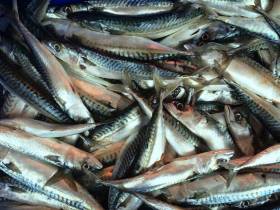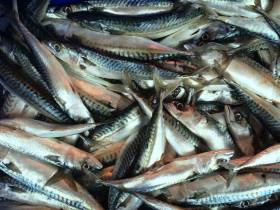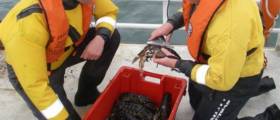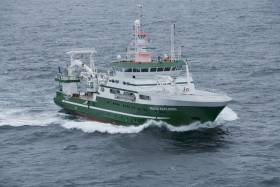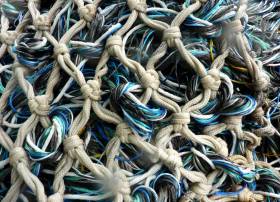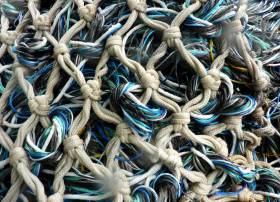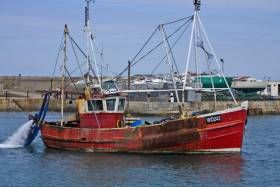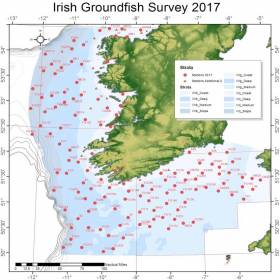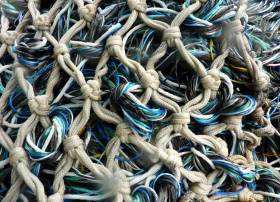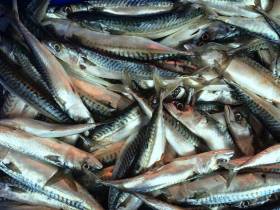Displaying items by tag: CFP
Irish Fishermen's Mackerel Quota Cut By One Fifth For 2019
#Fishing - The European Union, Norway and the Faroe Islands have agreed to a 20% reduction in mackerel quotas in the North East Atlantic for 2019.
The news for Ireland’s single most valuable fishery was the outcome of international fisheries negotiations which concluded in Bergen, Norway yesterday (Thursday 29 November).
Marine Minister Michael Creed — who described the negotiations, which also took place in Clonakilty earlier this month, as “challenging” — added: “The reductions reflect the available scientific advice that the abundance of this stock has declined. This level of reduction is seen by all parties as essential to ensure that the stock is fished sustainably.”
The minister also confirmed that agreement was reached on a two-year extension of the sharing arrangement between the three main parties. “This provides a welcome degree of stability for this hugely important fishery. Irish fishermen will now have a quota worth over €55m directly to our catching sector for 2019,” he said.
“While the quota for Ireland is less than that of recent years, those quotas were unusually high by historical standards. The quota of 55,000 tonnes achieved today is in line with our historical average quota.
“We must continue to be cautious with this crucially important stock. As always, industry representatives, in particular Sean O’Donoghue of the Killybegs Fishermen’s Organisation, were extremely helpful to the Irish negotiating team.”
Clonakilty Hosts Key Mackerel Quota Negotiations For 2019
Marine Minister Michael Creed welcomed today’s (Wednesday 7 November) resumption on Wednesday of important international negotiations on 2019 mackerel quotas for the stock in the North East Atlantic.
The negotiations, involving 11 EU and non-EU countries, are being hosted on behalf of the EU by the Department of Agriculture, Food & the Marine in the National Seafood Centre in Clonakilty, Co Cork and follow on from an initial round of negotiations in London in October.
“Mackerel is our single most important fishery economically and the negotiations this year are especially challenging given that the new scientific advice is for a reduction in quotas of 61%,” Minister Creed said.
“There are concerns from the scientific community about the quality of that advice but we need to take full account of all of the available information, the sustainability of the stock and the socio-economic importance of the mackerel fishery to peripheral coastal communities.
“These negotiations will be very difficult. The proposed 61% cut in the mackerel quota for 2019 would be very significant for our fishing industry along the western seaboard, particularly in Donegal, Galway, Kerry and Cork.
“Ireland is committed to the long-term sustainability of this stock and has worked hard to date to get a more graduated response to the scientific advice, taking account of the fact that this will be subject to a full review and quality assurance early in early 2019.”
Delegations from Ireland, the UK, France, Germany, the Netherlands, Denmark, Sweden, Norway, Iceland, Greenland and the Faeroe Islands will try and reach an agreement on the total allowable catch (TAC) for mackerel for 2019.
Up to 50 international delegates are expected in West Cork for the three-day negotiations. Officials from the Department of Agriculture, Food and the Marine, supported by scientists from the Marine Institute, will represent Ireland at these negotiations.
Minister Creed added: “I am pleased that Ireland, on behalf of the EU, is hosting this second round of Mackerel negotiations in the National Seafood Centre in Clonakilty. The fact that these negotiations are being facilitated by my department in Ireland underlines the economic importance of this stock to the Irish fishing industry.
“Mackerel is the single most valuable stock for the Irish fleet, and indeed the EU as a whole, and it is very much in our interests that we secure agreement at international level on management arrangements and catch levels for this stock.”
#Fishing - Marine Minister Michael Creed noted yesterday’s (Thursday 17 May) issue by the EU Commission of a Letter of Formal Notice as a first step in formal infringement proceedings being taken against Ireland for not implementing the new penalty points systems for sea fishing boat skippers and license holders.
The EU provisions for points for skippers is general in nature and requires primary legislation, while the provisions for licence holders are set down in detail in the EU Regulations and may be implemented by means of secondary legislation through a Statutory Instrument.
In relation to the points system for licence holders, on 20 March this year Minister Creed signed into law the European Union (Common Fisheries Policy) (Point System) Regulations 2018 (SI No 89 of 2018), which establishes a point system that will apply to the licence holder of a sea fishing boat when a serious infringement of the rules of the Common Fisheries Policy is detected within Ireland’s 200-mile exclusive fishery zone by all fishing vessels, both Irish and foreign.
This Statutory Instrument replaces a previous regime which was struck down by the Supreme Court following a successfully challenge by the fishing industry.
“The new SI has taken on board the Supreme Court judgements and also satisfies Ireland’s legal obligations under the Common Fisheries Policy and will address the infringement proceedings issued by the EU Commission on this matter today,” Minister Creed said.
In addition, the minister intends to submit in the near future a Memorandum to Government seeking approval for the drafting of a bill to provide for inter alia the separate EU points system for skippers, and forward the general scheme for consideration to the Oireachtas Joint Committee on Agriculture, Food and the Marine in the context of pre-legislative scrutiny.
Noting the receipt of the EU Commission’s formal notice, the minister said it “indicates that Ireland has two months to submit observations and I look forward to furnishing the commission with a detailed response advising that a system applying points to licence holders has been put in place already, and that I am working to introduce primary legislation in respect of masters of fishing vessels as a matter of urgency.”
2018 Anglerfish & Megrim Survey Begins Today
#MarineNotice - The Marine Institute’s annual Irish Anglerfish and Megrim Survey (IAMS) for 2018 is scheduled to resume today, Tuesday 10 April.
After January's survey off the West and South Coasts, this month's survey will be carried out till Saturday 21 April off the North and North West Coasts of Ireland in fulfilment of Ireland’s Common Fisheries Policy obligations.
The IAMS is a demersal trawl survey consisting of approximately 50 otter trawls of 60 minutes duration in ICES area 6a. Fishing will take place within a three nautical mile radius of the positions indicated in Marine Notice No 15 of 2018, a PDF of which is available to read or download HERE.
Survey operations will be conducted by the RV Celtic Explorer (Callsign EIGB), which will display all appropriate lights and signals during the survey and will also be listening on VHF Channel 16.
The vessel will be towing a Jackson demersal trawl during fishing operations. The Marine Institute requests that commercial fishing and other marine operators keep a three nautical mile area around the tow points clear of any gear or apparatus during the survey period outlined above.
Specifics of any fishing gear or other obstructions that are known and cannot be kept clear of these survey haul locations can be notified using the contact details provided in the Marine Notice.
New Report Says Ireland ‘Tops League Table’ For Fishing Quotas Against Scientific Advice
#Fishing - A new study points at Ireland has one of Europe’s worst offenders for overfishing, as The Irish Times reports.
The study from the New Economics Foundation was based on the outcomes of EU fisheries negotiations, evaluating total allowable catches, or TACs, against the prevailing scientific advice.
And it found that Ireland “topped the league table” for setting or advocating for quotas above what was deemed sustainable by experts.
That’s according to the report’s author Griffin Carpenter, who added that this practice “harms the environment, is short-sighted politics, and goes against the objectives of the CFP.”
Ireland joined the UK, Netherlands and Denmark among the “worst offenders in terms of the total tonnage of [total allowable catch] set above advice”, according to the report.
Birdwatch Ireland agreed with the study’s findings, lambasting Ireland as “among the most environmentally irresponsible fisheries nations in Europe” and warning of a catastrophe for the industry when the deadline to end overfishing under the CFP approaches in less than two years’ time.
The Irish Times has more on the story HERE.
Dutch Want Certainty For Post-Brexit Fishing Policy
#Fishing - The Netherlands has demanded certainty for Europe’s fishing industry after the UK’s withdrawal from the Common Fisheries Policy, as The Guardian reports.
Dutch fisheries minister Carola Schouten called on UK environment secretary Michael Gove to provide a formal proposal for arrangements between the British and European fishing communities post Brexit.
Gove and UK fisheries minister George Eustace have been critical of the CFP quota system but the UK has yet to put forward an alternative, Schouten argues.
Lough Foyle on Ireland’s North Coast is one of many outstanding issues that need to be resolved upon Britain’s exit from the EU and its policies, as Tom MacSweeney mused earlier this month.
“It is one sea, we have to share it,” she said. “I think it is proven that the [quota] system works.”
A promised white paper on the UK’s fisheries failed to appear before the end of 2017, prompting criticism from Scotland’s fishing community in particular.
The Guardian has more on the story HERE.
#Fishing - Following two days of intensive negotiations at the EU Fisheries Council which ended at 7.30am this morning (Wednesday 13 December), Marine Minster Michael Creed secured a total package of fish quotas worth €266 million for Irish fishermen for 2018.
For 2018, a total of 40,168 tonnes of whitefish quotas were agreed. Speaking from Brussels, Minister Creed explained: “The total €152 million value of the whitefish quotas secured for the Irish fishing fleet amounts to an 8% increase in value from last year and a 3% increase in volume. I am satisfied that this is a good and balanced result overall.”
Ireland’s quota for prawns amounts to 10,729 tonnes with a value of €83m. “This year we secured a 15% increase in prawns, worth over €10.6m directly to the Irish fleet, which is the biggest single increase in over a decade and shows the very healthy state of this stock, overall,” said the minister.
The rebuilding of many stocks in Irish waters is also demonstrated by a 34% increase in the Irish whitefish quota off the North West Coast and a 64% increase in the Irish Sea compared to five years ago – both areas where stocks were depleted.
Minister Creed spoke of the positive outcome for the Irish Sea, where he said “cod and haddock stocks have recovered after many years of intensive industry-led conservation measures.
“The cod stock in particular was in a near state of collapse since 2000. The work done to rebuild this stock and the haddock stock has paid off this year with significant increases for both quotas for our East Coast fleets.”
The Celtic Sea herring fishery is managed under a plan prepared by the Irish fishing sector which requires a 30% cut in 2018.
“In line with the recommendation of the Irish fishing sector, we have followed the management plan for Celtic Sea herring,” said Minister Creed. “This plan is precautionary and the cut is required to rebuild the stock after a period of decline since 2015.”
One difficult proposal concerned Ireland’s recreational sea bass fishery where the European Commission had sought a complete ban on angling for six months of the year.
Minister Creed successfully argued for a year-round ‘catch and release’ fishery that would not endanger the stock while protecting a vital tourism resource.
Overall, the minister spoke of his satisfaction that in this year’s EU Fisheries Council, another important step has been to deliver stocks at maximum sustainable levels.
“The progress we have made this year will continue the journey we are all on to rebuild our fish stocks which underpin the future of our industry and our coastal communities,” he said.
“There were a number of difficult issues facing us this year but I believe that the final package is a balanced and sustainable one. I would also like to express my appreciation for the cooperation and assistance I received from the fishing industry and NGO representatives in Brussels during the negotiations and in the months preceding them.”
The main outcomes negotiated at the 2017 EU Fisheries Council include:
- In the North West, a 20% increase in monkfish, a 21% increase for horse mackerel and a 26% increase in the haddock for the ports of Greencastle and Killybegs.
- A 15% increase in the prawn quota, worth €10.6m, which benefits the ports of Clogherhead, Howth, Union Hall, Castletownbere, Dingle and Rossaveal.
- In the Irish Sea, the recovery in the cod stock has seen a trebling of the quota; the Irish Sea haddock quota has also increased by 55%. These stocks are mainly important for the ports of Clogherhead, Howth and Kilmore Quay.
- A 13% increase for albacore tuna which is important for the southern ports of Castletownbere and Dingle.
- For the mixed whitefish fisheries off the South and West Coasts, a 2% increase in cod, a rollover in monkfish, an 11% reduction in haddock, and a 19% reduction in whiting all in accordance with scientific advice.
Groundfish Survey Off South & West Coasts Ongoing Till December
#MarineNotice - The Marine Institute advises that the annual Irish Groundfish Survey (IGFS2017) is being carried out off the South and West coasts of Ireland till Saturday 9 December in fulfilment of Ireland's Common Fisheries Policy obligations.
The IGFS is a demersal trawl survey consisting of approximately 125 fishing hauls of 30 min duration each in ICES area VIIb, VIIg and VIIj.
Fishing in 2017 is taking place within a two nautical mile radius of these indicative positions, the approximate locations of which are noted in Marine Notice No 55 of 2017.
As with last month's survey off the North West, the operation is being conducted by the RV Celtic Explorer (Callsign EIGB).
The vessel is displaying all appropriate lights and signals during the survey and is also listening on VHF Channel 16. It is towing a high headline GOV 36/47 demersal trawl during fishing operations.
Commercial fishing and other marine operators are requested keep a two nautical mile area around the tow points clear of any gear or apparatus during the survey period.
Meetings On Changes To National At-Sea Catch Sampling Programme Next Weekend
#Fishing - All interested vessel owners, skippers, crew and fishing industry professionals are invited to attend a series of nationwide meetings on the National At-Sea Catch Sampling Programme.
Emerald Marine, on behalf of the Marine Institute, will be hosting a number of informal meet-and-greets at various locations around the country over the weekend of 17-19 November to discuss recent developments to the National At-Sea Catch Sampling Programme.
Following changes to the European Data Collection Multi-Annual Plan, the Marine Institute is adopting a new statistically sound approach to the National At-Sea Catch Sampling Programme. The framework specifies the data collection to support implementation of the Common Fisheries Policy.
Emerald Marine Environmental Consultancy has been contracted to co-ordinate the new-look catch sampling programme, and has been doing so since July thus year. The Emerald Marine team has been contacting skippers and vessel owners to arrange catch sampling trips and coordinating the available samplers.
Emerald Marine's aim is to complete as many high quality sampling trips as is possible by maintaining good communication and working relationships with vessels, owners, skippers, POs and samplers.
Meetings are scheduled as follows (tea and coffee provided after each meeting):
- Friday 17 November, 12pm-2pm: Tara Hotel, Killybegs
- Friday 17 November, 7pm-9pm: Connaught Hotel, Galway
- Saturday 18 November, 12pm-2pm: Marine Hotel, Howth
- Saturday 18 November, 7pm-9pm: Three Sisters, Dunmore East
- Sunday 19 November, 2pm-4pm: Bera Hotel, Castletownbere
For more details contact Emerald Marine at [email protected] or by phone at 087 151 3541 or 087 145 5599.
Irish Fishing Fleet Sees Fall In Mackerel Quota For 2018
#Fishing - The new mackerel quota for Irish fishermen for 2018 will be just under 70,000 tonnes (69,143 tonnes) with a landing value of €70 million.
The figure marks a reduction of more than 17,000 tonnes on the 2017 quota of 86,429 tonnes for Ireland’s most valuable fishery.
Marine Minister Michael Creed TD made the announcement after the international fisheries negotiations which concluded in London on Wednesday (11 October).
These negotiations — between the European Union, Norway, the Faroe Islands, Iceland and Greenland — were focused on the sustainable management of the €1 billion annual mackerel fishery in the North East Atlantic.
“Mackerel is our most valuable fishery and allied to the fact that we are the second-largest EU quota holder, these negotiations are always of crucial importance to the Irish fishing industry,” said Minister Creed.
“There was new scientific advice this year which showed that, while the stock is in good shape, a precautionary approach for long-term sustainability was necessary, with a significant reduction in quota recommended.
“Accordingly, following careful consideration of scientific advice of the International Council for the Exploration of the Seas (ICES) and discussions with the Marine Institute and industry stakeholders, I supported a reduction, in line with the agreed Long Term Management Strategy, in the quota for 2018.”
The current sharing arrangement for mackerel was agreed in 2014 between three parties only: the EU, Faeroes and Norway. An amount is held in reserve to accommodate the other parties.
This agreement is due to expire at the end of 2018, and it is expected that intensive negotiations on a new agreement will take place throughout next year.
“The quotas agreed for 2018 are consistent with the Long Term Management Strategy which aims to provide sustainability and stability in this hugely valuable fishery in line with the scientific advice,” Minister Creed added.
“In terms of the negotiations to come these are likely to be further complicated by Brexit. I remain dissatisfied with the 2014 agreement and will be working for a more equitable sharing arrangement that also protects the ongoing long-term sustainability of the mackerel stock.”



























